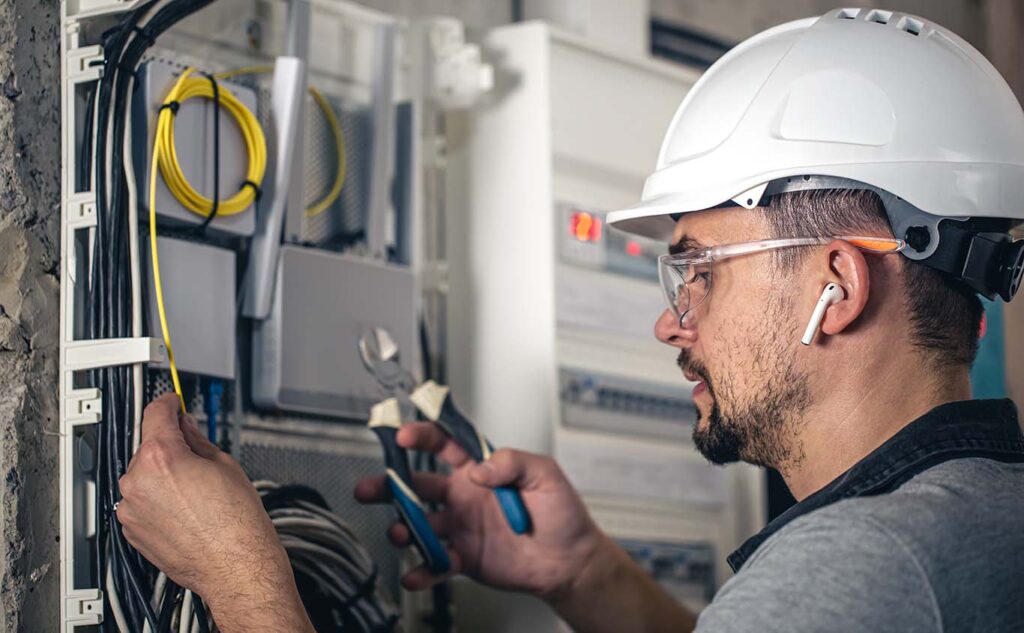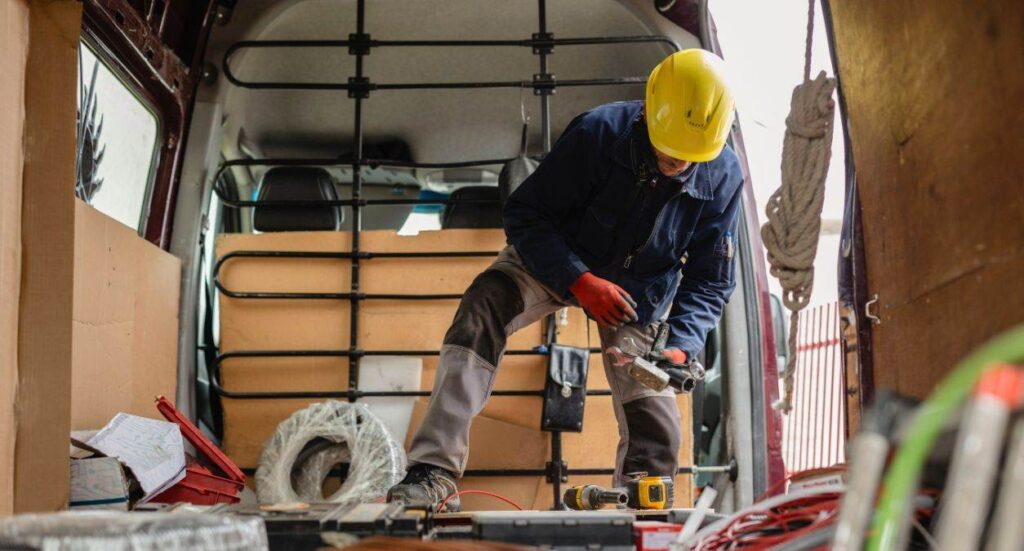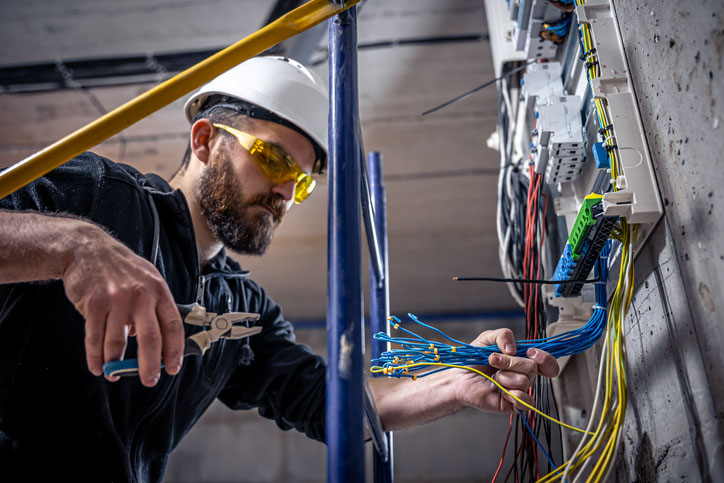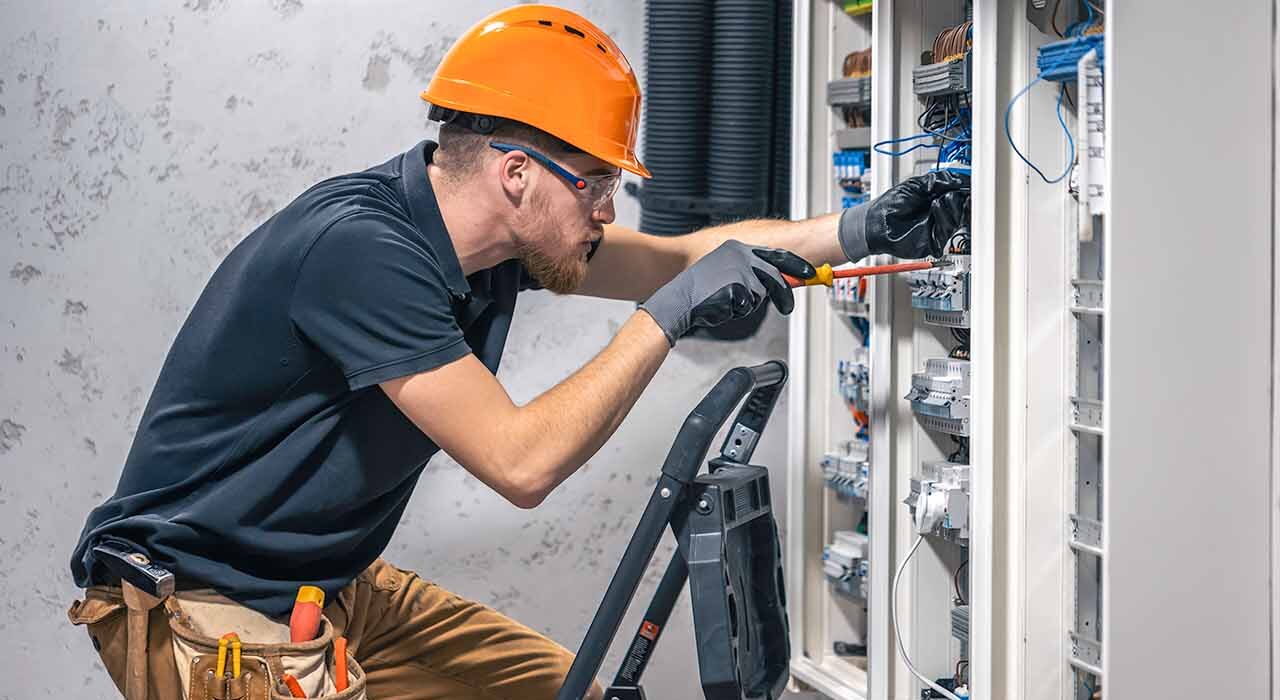Table of contents
Before you land your first job or start quoting for work, there’s one crucial thing you need to get sorted: your electrician tools. Not just any tools – the right ones. And with so many options out there (and keeping your pressured bank balance in mind), knowing what to buy first can feel like a job in itself.
Investing in specialist tools is a considerable expense, especially when you’re just starting out. Separating what’s essential and what’ you’ll need for specialist jobs can help you assess what you’ll need to own.
In this guide, we’ll walk through the tools you need, how much you might spend, and how to keep your toolbox in top shape.
Essential tools every electrician needs

Every spark needs a solid foundation, and that means reliable, everyday tools. Here are the basics, along with the types of jobs they’re used for:
- Pliers: At least a pair of needle-nose, lineman’s, and side cutters. These are used daily for cutting, twisting, and gripping wires, making them essential for general wiring, installing sockets, and consumer unit work.
- Screwdrivers: A set of insulated screwdrivers is non-negotiable. Go for a mix of flathead, Phillips, and a multi-bit driver for flexibility. These are used for installing and removing screws on faceplates, backboxes, and terminals.
- Wire Strippers: Save yourself time and avoid damaging wires – invest in a good pair with clear gauge markings. Perfect for stripping insulation off cables before making connections.
- Voltage Tester or Multimeter: For checking if a circuit is live and diagnosing faults. Multimeters are more versatile and ideal for fault finding, continuity checks, and verifying voltage levels.
- Tape Measure: A 5-metre tape does the job. You’ll use it for marking out positions for sockets, switches, and conduit runs.
- Utility Knife: Used for stripping cable sheaths, trimming insulation, and opening boxes – useful for first fix work and cable prep.
- Fish Tape or Cable Puller: Essential when running wires through conduits, trunking, or wall cavities, especially on new installations or rewires.
- Spirit Level: Keeps sockets, switches, and trunking aligned and looking professional – important for visible installs.
- Hammer: Not just for nails – handy for knocking cable clips into place, freeing stuck parts, or securing fixings during installation.
Look for VDE-rated tools where needed to make sure they’re safe for electrical work.
Specialist tools for different electrical jobs

Once you’re doing more advanced or specific work, you’ll need tools to match the task. These aren’t necessarily for day one, but definitely worth knowing about:
- Circuit Tracer & Breaker Finder: Ideal when trying to identify which breaker controls a specific circuit – helpful during fault finding, repairs, or additions.
- Cable Crimper: Needed for attaching lugs, ferrules, and terminals securely – essential for working with armoured cable or connecting to distribution boards.
- Conduit Bender: For neat and accurate bends in metal or plastic conduit. Crucial for commercial installs, where exposed conduit is common.
- Thermal Imaging Camera: Not cheap, but useful for fault-finding and preventative maintenance. Great for identifying overheating components, loose connections, or overloaded circuits.
- PAT Tester: Essential if you plan to test portable appliances in domestic, commercial, or industrial environments. Often required for landlords, offices, and workshops.
- RCD / Earth Loop Testers: These are a must for proper testing and certification of installations. Used during EICRs, new installs, or when troubleshooting protection devices.
- Punchdown Tool: For working on structured data cabling and telecoms work. Ideal if you’re branching into networking, CCTV, or home automation.
Pick these up as your work expands – no need to break the bank upfront.
What should be in an electrician’s tool bag?

You don’t want to lug your entire workshop around with you. A good tool bag should be compact but packed with the essentials:
- Core hand tools (pliers, screwdrivers, strippers)
- Tester and multimeter
- Utility knife, tape, and level
- Pencil and marker
- Cable ties and tape (insulating, electrical, duct)
- Small torch or headlamp
Many electricians swear by tool backpacks for comfort and better organisation. Keep less-used or larger gear in the van.
Organising your tools
A well-organised toolkit saves time and prevents damage to your gear. Here’s how to keep things tidy and efficient:
In your tool bag or backpack:
- Use internal compartments and pouches to separate hand tools, testers, and accessories.
- Store sharp items like utility knives in blade guards or designated holders.
- Keep small bits (screws, rawl plugs, terminal blocks) in clear mini-containers or pouches.
- Label key compartments if your bag has multiple layers or sections.
In the Van:
- Use stackable organisers or drawer systems for larger tools like drills, crimpers, and benders.
- Keep power tools in their cases to avoid damage and tangling cords.
- Dedicate zones for frequently used items (e.g. left-hand side for test equipment, right-hand side for install tools).
- Use magnetic strips or pegboards for wall-mounted tool access.
- Restock your tool bag at the start or end of each day so you’re always job ready.
Good organisation not only makes you faster and more professional but also helps prevent lost tools – and nothing wastes time like rooting around for a missing screwdriver! Consider doing a monthly tidy-up to keep your setup in top shape.
How much do electrician tools cost?
Here’s a ballpark idea of what you might spend:
- Basic starter kit: £150–£300
- Mid-range kit: £400–£800
- Professional setup: £1,000+
Specialist tools like RCD testers or thermal cameras can push the budget up, but you don’t need everything at once. Look out for deals at trade counters or bundle kits from brands like CK Tools, Wera, or Fluke.
Tips for buying tools on a budget
Starting out can be costly, but there are ways to save:
- Buy essential tools first – don’t overstock early on
- Consider second-hand tools from reputable sellers or colleagues
- Watch for trade discounts or cashback offers
- Stick to known brands that offer warranties and replacements
Remember: cheap tools often end up costing more in the long run.
Maintaining and upgrading your tools
Treat your tools well and they’ll last:
- Clean tools regularly – especially after dusty or damp jobs
- Keep cutting tools sharp
- Store them in a dry, organised tool bag or box
- Calibrate meters and testers annually
- Consider insurance for high-value items, especially if stored in your van
Safety considerations and tools

When you’re working with electricity, safety should always come first. The right safety tools and procedures not only protects you but also those around you. Here’s what to keep in mind:
- Insulated Tools: Always use VDE-rated tools when working on or near live circuits. These are tested to 1,000V and help prevent accidental shocks.
- Voltage Testers: Always test circuits before starting work – even if you think they’re isolated. A non-contact tester is a quick check, but a two-pole voltage tester gives greater certainty.
- Lockout/Tagout Kits: For isolating circuits safely while you work. Essential for commercial settings or anywhere someone else might unknowingly re-energise a system.
- PPE (Personal Protective Equipment): At minimum, carry insulated gloves, safety glasses, and a dust mask. For certain environments, you may need arc-flash rated gear.
- First Aid Kit: Keep a basic kit in your van or tool bag. Even small cuts and burns need proper treatment to avoid infection.
- Fire Extinguisher: Especially important if you’re working in older buildings or near distribution boards. A CO2 extinguisher is ideal for electrical fires.
Safe working habits
- Always double-check isolation before touching any conductors.
- Work methodically and avoid distractions.
- Use proper signage or barriers when working in public or shared spaces.
Investing in safety isn’t just about ticking boxes – it gives you peace of mind and shows clients you take your trade seriously.
Digital tools for the modern electrician
It’s not just about screwdrivers and testers these days. Digital tools can seriously boost your efficiency:
- Job management apps like Tradify or Fergus
- Certification software (e.g. NICEIC, iCertifi)
- Cable calculators, voltage drop tools, and load calculators
- AutoCAD Electrical or EasyPower for layout and design
Final checklist: Build your first electrician’s tool kit
Start simple, then expand:
Basic Kit:
- Pliers, screwdrivers, strippers, knife
- Voltage tester, tape measure
- Tape, level, tool bag
Intermediate Kit:
- Multimeter, crimper, fish tape, torches
Advanced Kit:
- RCD tester, conduit bender, thermal imager, PAT tester
Getting your electrician tool kit right is a big part of becoming a confident, capable trades professional. Start with the basics, grow as you go, and don’t be afraid to ask fellow sparks for their recommendations. The right tools don’t just make your work easier – they make it safer and more professional too.
Insure your tools with Electricians’ Insurance from Protectivity
At Protectivity, we provide affordable tools insurance to cover incidents commonly faced by electricians’ and other tradespeople, including tools of trade theft.
Our electricians’ insurance policies include public liability up to £5 million as standard; you then have the option to add Employers’ Liability insurance, Contractor Works cover, Plant and Tools cover, financial loss and employee tools (only if you’ve included the other benefits). That way, when unforeseen circumstances occur, you can ensure you’re protected from unexpected costs.
Find out more about our affordable tradesperson insurance, excellent claims handling, and monthly payment options when you request a quote today.
Get Electricians' Insurance from Protectivity

*Disclaimer – This blog has been created as general information and should not be taken as advice. Make sure you have the correct level of insurance for your requirements and always review policy documentation. Information is factually accurate at the time of publishing but may have become out of date.
Last updated by

















